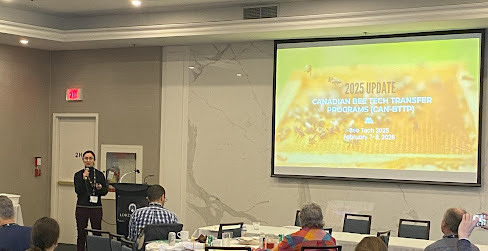The Atlantic Tech Transfer Team for Apiculture team had the opportunity to attend the Canadian Association of Professional Apiculturists (CAPA) annual general meeting 2025 last week (Ottawa, ON). In addition, the team attended the National Beekeeping Convention hosted by CAPA and the Canadian Honey Council (CHC). These meetings are an important events in the Canadian beekeeping calendar and our region was well represented by beekeepers, government and other stakeholders. Read this week’s blog for a summary of the events.
Review: Canadian Association of Professional Apiculturists Annual General Meeting and the Canadian National Beekeeping Convention 2025
The
Canadian Association of Profession Apiculturists (CAPA) is the group of professionals
who conduct research, educate and otherwise support the beekeeping industry
across the country. This group of
apiculturists converge every year at the CAPA annual general meeting. The 2025 meeting, held in our nation’s
capital, started with a president’s report from Professor Ernesto Guzman. One
immediate point of concern raised was the average colony loss for the winter
2023-2024 (34.6%) was higher than the average of historic annual losses (27.7%). This
opening remark was followed by a general overview of all CAPA activities, including
highlights from the various committees and a welcome to start the proceedings.
CAPA member, Stephen
Page (Agriculture and Agri-Food Canada), gave an overview of national statistical
trends in honey, beekeeping, and pollination. Canada continues to receive
package bees from Australia, Chile, Italy and New Zealand. As for queen
imports, Canada receives queens form Italy, New Zealand, Chilie, Australia,
Denmark, and Hawaii. The amount of Canadian honey being consumed
by Canadians continues to increase. Most exported honey goes to the United
States and Japan. Finally, the number of beekeepers across the country
(hobbyist and commercial) continues to increase.
Rod Scarlett (CHC, Executive Director) presented a
report on behalf of the Canadian Honey Council. Scarlett described some of the
roles and responsibilities of CHC, such as mitigating honey fraud in Canada and
providing education and training to beekeepers across Canada. The board of the CHC also joined the CAPA
meeting for an opportunity to discuss issues of mutual concern.
Other
important reports included the Canadian Bee Tech Transfer Programs (CAN-BTTP) committee discussing
works to support and create collaboration between each of the Tech Transfer
programs in Canada. The Tech Transfer programs have been busy conducting
regional research and providing extension support to Canadian beekeepers. The first
day was concluded with each of the provincial apiculturists/apiarists provided an
update for each of their respective provinces.
After
the conclusion of the annual business meetings by the CHC and CAPA, the two groups
were joined by other beekeepers for the National Beekeeping Convention. This series of presentation over two days
ranged in topics from honey bee nutrition to the threat of Tropilaelaps mites for
Canadian beekeeping. The keynote speaker,
Dr Priya Chakrabarti Basu (Washington State University) gave a fascinating talk
on bee nutrition and habitat. Dr
Chakrabarti Basu discussed some of the challenges of bee nutrition in the face
of climate change. Closer to home, Professor
Pierre Giovenazzo of Laval University, presented research on commercial
pollinator density and wild blueberry yields.
His findings suggest that increasing stocking rates and combining
managed pollinators will have a beneficial effect on wild blueberry yields. This works is to be published very soon and a
full review will be in a future blog post.
An
update on the Canadian Bee Gut Project was provided by Brendon Daisley (University
of Guelph). Many beekeepers from across
the country, including the ATTTA team, have provided samples to the project and
it was good to hear some results. This
work suggests some very intriguing links between honey bee gut health,
including bacteria, and overall honey bee health. As this work progresses, it will be interesting
to see final conclusions and indications of how this knowledge will benefit
honey bees and the industry.

Dr Nuria Morfin providing an update on the Canadian Bee Tech Transfer Teams at the 2025 Canadian National Beekeeping Convention.
As
the meeting progress it was an impressive range of presentations which highlighted
the important work that is being undertaken across Canada to support the honey
bee industry. The panel on the threat of
Tropilaelaps mites created some interesting discussions on that emerging threat. Many topics and presentations included
aspects of climate change as this becomes a particular challenge to the beekeeping
industry. There was, of course, a great
deal of time spent talking about Varroa mite management. The first day was closed with a presentation
from Nuria Morfin and Matthew Polinsky as an update on the activities of the
seven Canadian tech transfer teams for apiculture.
Thank you to everyone who participated and organized this great event, and to all those who support the beekeeping industry of Canada. These events are important for all beekeepers in Canada to ensure current knowledge and information is disseminated across the country. All the presentations represent work that is crucial for our industry in facing current and future challenges.
Connecting with ATTTA Specialists
If you’d like to connect with ATTTA specialists or learn more about our program, you can:
Email attta@perennia.ca

